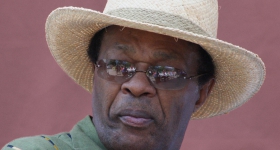“Groundbreaking” is a word often used describe Orange Is The New Black, and it’s not an entirely unwarranted description. The show highlights a broad spectrum of body types, races, sexual orientations, and genders within the walls of Litchfield Penitentiary, women who are otherwise under- or mis-represented in the media.
But for all of its sensitivity, the show has developed a blind spot, and over its three seasons, Orange Is The New Black has repeatedly failed its Asian characters. Chang and Brook Soso -- the only two Asian inmates -- are, at best, underdeveloped, and at worst, common stereotypes of Asian women in popular media. It is only now, in the third season, that the viewer begins to see these two women’s characters develop, but those advances are offset by tasteless jokes made at the expense of Asians.
OITNB’s relationship with its Asian characters started off rocky, in no small part because there was only one Asian in the show’s first season. Referred to only by her last name, Chang (Lori Tan Chinn) lives on the periphery of prison life and rarely interacts with or is mentioned by other characters. She speaks in a broken English, coated with a thick, generic “Asian” accent. To see an Asian on TV as a criminal, rather than a doctor or some kind of hyper-sexualized woman, is a notable advance, but in these earliest episodes, Chang barely graduates beyond the role of wallflower.
With the second season of OITNB came the introduction of a second Asian inmate, and at first, it seemed like Brook Soso (Kimiko Glenn) would be poised to be the developed Asian character the show lacked. But she was quickly marginalized, sexualized, and even mocked for her Asian heritage. Her last name, which is vaguely oriental-sounding but of indeterminate ethic origin, is difficult for the other inmates to understand. At one point, Piper Chapman (Taylor Schilling) admits she has a hard time saying Soso’s “name with a straight face.”
It is only in the show’s third season that Chang and Soso start to find their voices and the audience learns more about these women’s lives beyond the prison walls. But even these moments of nuance are full of clichés, a dichotomy perfectly encapsulated by the sixth episode of the season, which has the questionably offensive title “Ching Chong Chang.” The episode follows Chang’s path to prison and forces the viewer to question traditional beauty standards and humanize the otherwise marginalized inmate, but it also involves Tae Kwon Do, even though Chang is revealed to be Chinese, and the illegal trade of rhino horns. Nonetheless, it’s a huge step forward for Chang’s insecurities to be placed front and center for the first time, and to even hear her speak in full sentences.
Meanwhile, Soso retreats from prison life and spends the season struggling with depression. The arc isn’t exactly uplifting, but it is still somehow refreshing given the taboo of mental illness in Asian culture. The typecasting returns again, as a flashback of Soso practicing piano as a young girl, yelled at by her “Tiger Mom” for neglecting to play the final repetition. Another Asian stereotype, but it’s at least balanced out by Soso’s struggle to find a community in Litchfield.
Confusingly, the progress made by the two individual characters in this most recent season is undermined by repeated mockery of Asians as a group. In one scene, Joe Caputo (Nick Sandow) is guiding a group of executives from a private corporation around the prison. The posse is primarily made up of white male executives with a single unnamed Asian female. Black Cindy (Adrienne C. Moore) spots the group the group and greets them, “White people. And other.” The Asian executive says nothing and Caputo promptly escorts the group out.
Another cringe-worthy joke made at the expense of Asians happens in the electric shop, when Chapman asks Joel Luschek (Matt Peters) if he’s worried about leaving computers with inmates to fix up. He responds, “Maybe if any of you were technically savvy. Or Asian. But we screen for that.” Nicky Nichols (Natasha Lyonne) then looks at Chapman, pulling her eyes back to make them seem squinty.
These jokes seem to have no purpose except to insult Asians, and that kind of onenote humor feels out of place for a show so celebrated for its carefully considered and multidimensional female characters. This isn’t to say that race- or gender-based jokes are, or should be, off-limits for OITNB, because they aren’t. Lorna Morello (Yael Stone) makes a rude joke to transgender inmate Sophia (Laverne Cox), calling her a “lady-man.” But instead of letting it slide, Sophia calls Morello out on the slur and stands up for herself and the population she implicitly represents. The Asian characters don’t have that same opportunity, to confront racist jokes as they happens, and instead are relegated to either putting up with it or not even knowing it’s happening, which is a much more insidious fate.
If the viewer is willing to give OITNB the benefit of the doubt, the on-screen marginalization of Asians might be intentional. Asians make up a small minority of the U.S. federal prison system, just 1.5 percent, according to the Federal Bureau of Prisons, so this poor treatment toward Asian inmates on the show could be a commentary about the ways in which Asians slip through the cracks in conversations about race.
On a less political (and, in my opinion, more plausible) level, the constant stream of mockery drives the characters, as the feeling of being left out is one Soso becomes part of her main story arc. It’s even something she complains about to Chang, saying, “You know what sucks? Belonging to a race that doesn’t commit enough low-value crimes to be relevant in a place like this. Where’s my big, Asian prison family?” Isolation and insecurity are also important motivators in Chang’s story, and those personal feeling are reinforced on a systemic level by these seemingly tasteless jokes and comments made at the expense of Asians.
There is a way for the show to make a statement about isolation and to build character arcs without reinforcing many of the stereotypes of Asians seen on TV, like that of the immigrant incapable of communicating in English, or reducing itself to onenote jokes with racist undertones. Making sure Chang’s and Soso’s characters are nuanced and empowered will counteract these tone deaf comments from the other inmates, and these changes begin to take hold in the third season. “My eyes squinty but ears work fine,” chides Chang as two inmates mercilessly tease her in the bathroom. But it shouldn’t have taken three seasons for the show’s first Asian character to stand up for herself, and Orange Is The New Black cannot truly be the inclusive voice it posits itself to be without a more empathetic portrayal of its Asian characters.
***
Maxine Builder is a freelance writer who lives and works in a renovated warehouse in Brooklyn. She is a fashion and beauty contributor to Bustle.com, and her work has also appeared in the Los Angeles Times, ForeignPolicy, xoJane, and [wherever] Magazine.









Comments